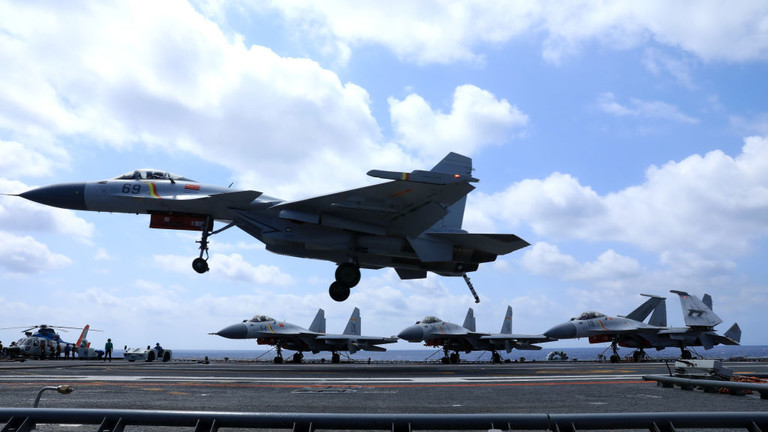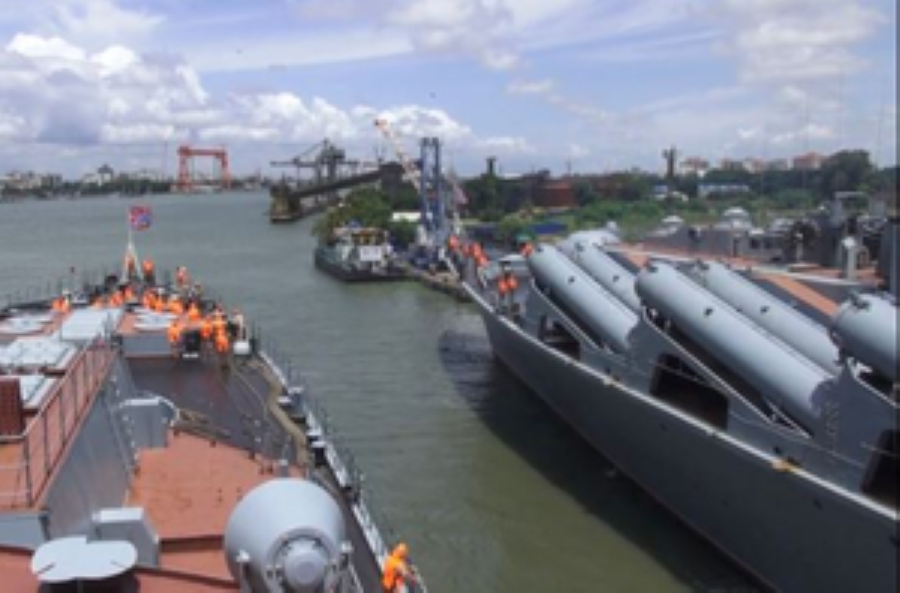©Getty Images/VCG/Contributor
China has conducted a combat patrol near disputed territory in the South China Sea, following military maneuvers there by the Philippines along with the US and other Western allies.
According to media reports, the Chinese military’s Southern Theater Command announced on Wednesday that it had carried out air and sea combat patrols near Scarborough Shoal to test “strike capabilities.”
Scarborough Shoal, known as Huangyan Island in China and Panatag Shoal in the Philippines, is claimed by both Beijing and Manila. It is about 220 kilometers (120 nautical miles) west of the Philippine Island of Luzon.
The Chinese maneuvers tested the reconnaissance and early warning capabilities of its troops, according to Beijing.
“All military activities that disrupt the South China Sea, create hotspots, and undermine regional peace and stability are all being controlled to the best extent,” it stressed.
The combat patrol has reportedly been carried out in response to same-day military drills conducted by the US, Australia, Canada and the Philippines.
In a joint statement, military chiefs of the four countries vowed to “uphold the right to freedom of navigation and overflight,” and other uses of the sea and international airspace allowed under international law.
They said the two-day exercises were being held to uphold unhindered passage in the Asia Pacific region. The South China Sea is the subject of numerous overlapping claims by countries in the region. Apart from China and the Philippines, Vietnam, Malaysia, Indonesia, and Brunei claim parts of it. The waterway sees significant volumes of commercial traffic and serves as the key conduit for the foreign trade of South Asian nations.
Tensions in the region have been further aggravated by the activities of the US and its allies, which routinely send in so-called “freedom of navigation” missions through the area claimed by Beijing as its exclusive economic zone.
Last week, the Philippines and Japan conducted their first joint maritime drill in the South China Sea.
China has repeatedly cautioned the Philippines against strengthening military cooperation with the US, saying it will be used to serve Washington’s geopolitical agenda to the detriment of Manila’s own security.
Relations between the two Asian countries have worsened since Philippines’ President Ferdinand Marcos Jr, who took office in 2022, allowed American forces and weapons access to four additional Philippine military bases. Some of those bases are located near the disputed waters.
Washington had been “stirring up trouble” in the South China Sea, undermining efforts by China and its neighbors to maintain peace and stability in the disputed waters, the Chinese embassy in Manila has argued.
Standoff
Beijing and Manila have been locked in a tense standoff in recent months, as China continues to press claims to almost the entire South China Sea, despite a 2016 international tribunal ruling that its assertion has no legal basis.
Scarborough Shoal is 240km (150 miles) west of the Philippines’ main island of Luzon and nearly 900km (560 miles) from the nearest major Chinese land mass of Hainan.
China seized the shoal, a triangular chain of reefs and rocks that form part of a rich fishing ground, after a months long stand-off in 2012. The shoal had long served as a safe harbour for Filipino fishermen.
There have also been confrontations at Second Thomas Shoal where the Philippines makes regular resupply missions to sailors living on board a warship that Manila grounded there in 1999. Second Thomas Shoal, which lies about 200 kilometres (124 miles) from the western Philippine island of Palawan, and more than 1,000 kilometres (621 miles) from China’s southern Hainan island.
In June, Chinese coastguards armed with knives and axes boarded Philippine naval vessels near the strategic reef with one sailor losing a thumb and Philippine equipment seized or destroyed.
Beijing blamed the escalation on Manila and maintained its actions to protect its claims were legal and proportional.
Last month, the US said it would provide $500m in additional military funding to the Philippines to combat Beijing’s growing assertiveness in the region.
Beijing said in response that “wooing countries from outside the region to provoke confrontation… will only undermine regional stability and aggravate tensions”.
The investment “will only lead to greater insecurity” for Manila, it warned.
In addition to China and the Philippines, Vietnam, Malaysia, Brunei and Taiwan also claim parts of the sea, which is regarded as a potential flashpoint and a delicate fault line in the US-China regional rivalry.
The US military has deployed navy ships and fighter jets for decades in what it calls freedom of navigation and overnight patrols, which China has opposed and regards as a threat to regional stability.









